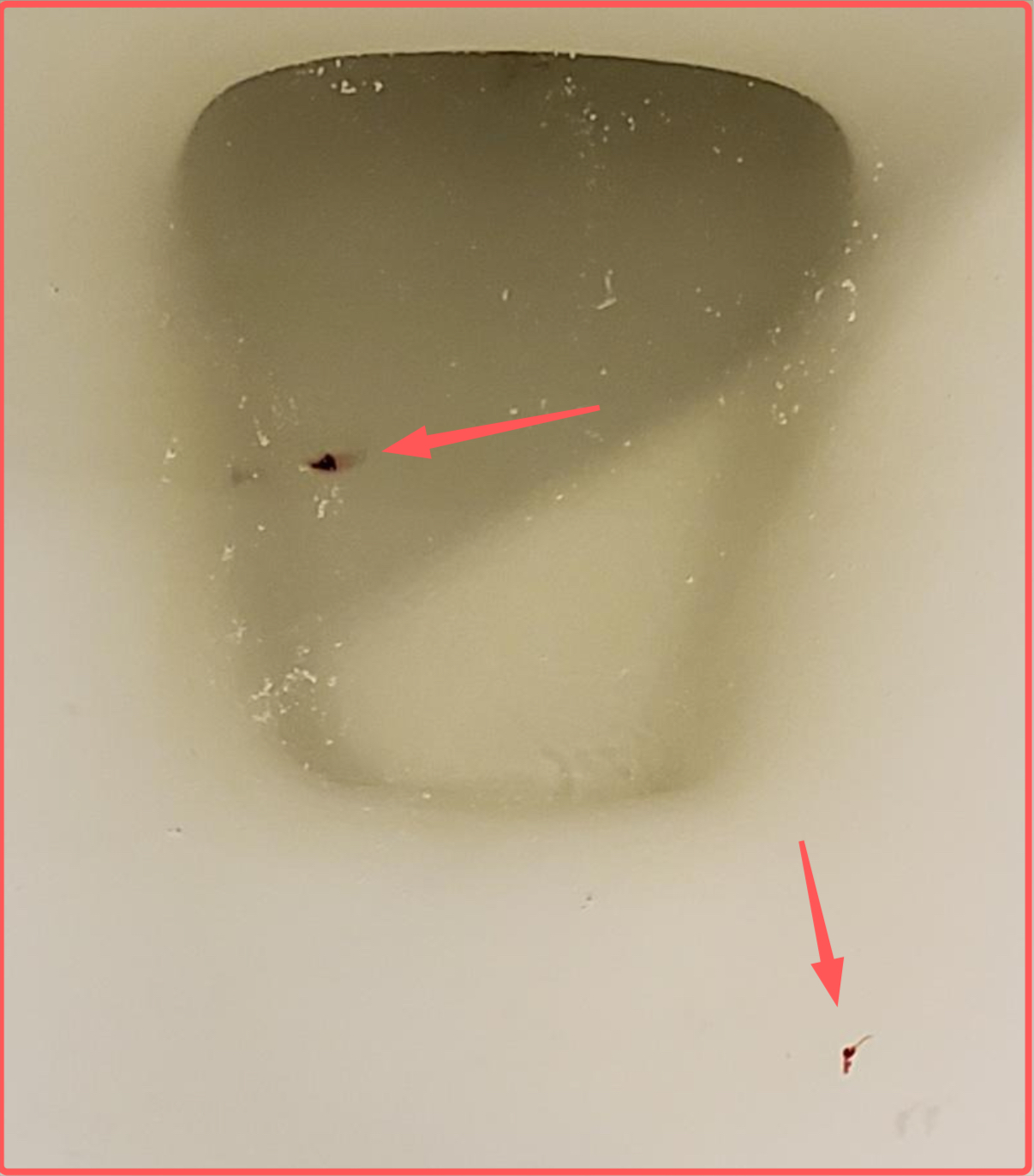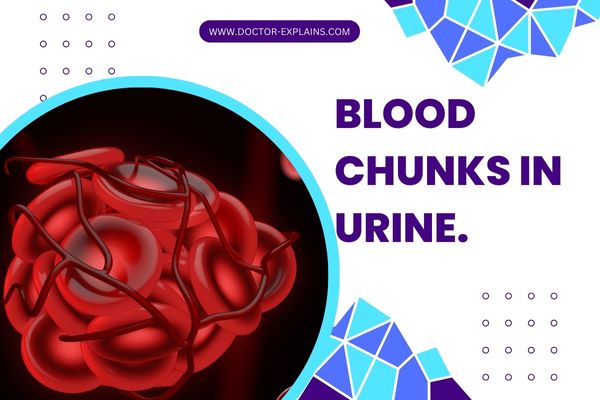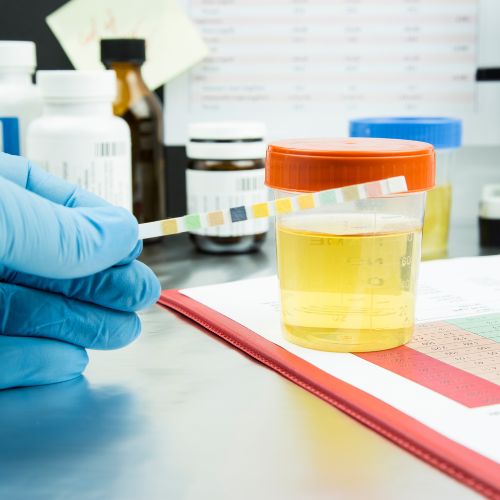5 Main Causes of Small Blood Clots In urine & When to Worry.
Our content is not intended nor recommended as a substitute for medical advice by your doctor. Use for informational purposes only.
Key Points:
- Hematuria is the presence of blood in the urine, and it indicates bleeding somewhere in the urinary tract.
- Small blood clots in urine may appear without significant reddish discoloration of urine and can be accompanied by hematuria.
- Common causes of small blood clots in urine include UTI, renal stones, bladder cancer, recent trauma or instrumentation of the urinary tract, exercise-induced hematuria, and bladder cancer.
- Unexplained tiny blood clots in urine should always be investigated by a doctor.
- Blood clots in urine exclude glomerulonephritis and denote significant “focal” bleeding.
- Bladder cancer causes painless blood clots in urine in patients with risk factors for cancer.
- Any unexplained blood clots in urine should be reported to and investigated by a doctor.
[1] Introduction to Hematuria
Hematuria is the presence of blood in the urine. It is considered serious because it indicates bleeding somewhere in the urinary tract.
Hehamturia (blood in urine) can be with or without the presence of blood clots:
Hematuria can be accompanied by blood clots, which can vary in size. Small blood clots in urine can appear without significant reddish discoloration of urine (small blood clots in yellow-colored urine).
The cause of blood clots in urine is typically obvious:
Many diseases and conditions may result in small blood clots in your pee. However, the cause is typically obvious based on symptoms or your previous history of kidney or bladder issues such as recurrent UTIs, stones, cancer, etc.
A doctor should always investigate unexplained tiny blood clots in urine, even if they are temporary.
[2] Bloody urine vs. blood clots: what is the difference?
The presence of blood in the urine (hematuria) is sometimes classified according to its source:
- Blood from the inside of the urinary tract: from the urethral wall, bladder wall, ureteric wall, or the kidney.
- Glomerular hematuria: Normally, the kidney glomeruli don’t let the blood pass through its glomeruli (tiny structures inside the kidneys that filter urine). However, some diseases affecting these kidney glomeruli allow the passage of reddish or brown blood into the urine.
Blood clots in urine exclude glomerulonephritis:
Glomuerlular hematuria is common with many kidney conditions (such as nephrotic syndrome).
Blood clots in urine (large or small) often denotes bleeding inside the urinary tract (and NOT glomerular bleeding). Therefore, as doctors, we use the presence of blood clots in urine as evidence of the absence of glomerular effects (which can be a serious condition).
Blood clots in urine denote significant “focal” bleeding:
Blood clots in urine (small or large) often mean the bleeding inside the urinary tract is significant. The larger the blood clots, the heavier the bleeding is.
So, you should take any blood clot in urine (even if it is tiny) more seriously and report them to your healthcare professional.
[3] What are the causes of small blood clots in urine?
Common causes of small blood clots in urine include:
- Stones in the urinary bladder, kidneys, or ureters.
- Acute cystitis with hematuria (urinary tract infection or UTI).
- Recent trauma or instrumentation of the urinary tract.
- Bladder cancer.
- Other types of malignant and benign tumors of the kidney and urinary tract.
- Excersice-induced hematuria.
- Endometriosis of the urinary tract (in females).
- Prostatic diseases and cancer (in men).
- Strictures (narrowing) of the urethra or ureters.
- Other less common causes:
- Adult polycystic kidney disease.
- Pyelonephritis (complicated UTI).
- Arteriovenous malformations in the kidney or urinary tract (abnormal blood vessels).
- Ureteric or bladder polyp.
- Radiation cystitis (inflammation of the urinary bladder after pelvic irradiation therapy).
- Recent operations in the urinary tract or prostate.
- Urethral diverticulum (in women).
- False hematuria (tiny blood clots appear in the toilet due to menses, spotting, or other causes of vaginal bleeding.
- Urethritis (mainly due to sexually-transmitted diseases).
The table below illustrates the common causes of small blood clots in urine in males and females:
| Commonest Causes of small blood clots in urine in males | Commonest causes of small blood clots in urine in females. |
|---|---|
| 1. Kidney/urinary tract stones. | 1. UTI. |
| 2. BPH (benign prostatic hypertrophy). | 2. Kidney/Urinary Tract Stones. |
| 3. Recent trauma or instrumentation of the urinary tract | 3. False blood clots in urine (vaginal bleeding). |
| 4. Excercise-induced hematuria | 4. Endometriosis of the urinary tract. |
| 5. UTI | 5. recent trauma, instrumentation, or exercise induce hematuria. |
| 6. Bladder cancer. |
Notes on the common causes of small blood clots in urine.
[A] UTI and small blood clots in urine.
UTI (urinary tract infection) is very common, especially among sexually-active women. UTI causes severe bladder wall inflammation leading to minute bleeding, which can form tiny blood clots when peeing.
Suspect UTI as a cause of your small blood clots in urine if you have:
- Risk factors for UTI.
- Symptoms of UTI.
Risk factors for UTI (reference):
- Females: UTI is extremely common in females due to the following:
- Shorter distances between the urethral opening and the bacteria (from poop).
- The area around the urethral opening is always moist.
- Hormonal changes with contraception and during pregnancy.
- Recent sexual intercourse.
- The use of spermicide-coated condoms or diaphragms.
- Diabetes mellitus.
- The use of urinary catheters.
- After a kidney transplant (mainly due to immunosuppressive drugs).
Typical symptoms of UTI:>
- Dysuria (pain during urination).
- Urinary frequency.
- Frequent waking up to pee at night (nocturia).
- Sudden urge to pee (urgency).
- Bladder pain (suprapubic pain).
- Blood in the urine (hematuria) in acute cystitis with hematuria cases. The urine may also contain small blood clots in urine.
- Cloudy (turbid) urine in some (not all) cases.

Learn more about UTI with hematuria.
[B] Kidney stones & small blood clots in urine.
- Kidney stones form inside the urinary tract or pass through it.
- It may cause injury to the wall and significant bleeding.
- Blood clots in urine are commonly associated with people with kidney stones.
- Suspect if
Stones in the urinary tract can be found in any part (kidneys, ureter, urinary bladder, or the urethra). Stones of the urinary tract may cause injury to the lining walls of the urinary tract leading to bleeding and tiny blood fragments in urine (clots).
The blood in urine is common when the stone moves through the urinary tract and passes throw narrow tracts (the ureter or the urethra).
Suspect kidney stones as a cause of UTI when you have symptoms of kidney stones or if you have already passed a stone with urine.
Symptoms of stones include:
- Kidney stones cause loin pain (in the flanks and upper back on both sides).
- Bladder stones often cause central pelvic pain (urinary bladder pain).
- Ureteric stones cause severe flank pain that radiates to the groin and the inner thigh.
- Some cases are completely asymptomatic and may present with isolated blood in the urine.
- The pain is often sudden onset, severe, and colicky and may last minutes to hours.
[C] Bladder cancer.
Urinary bladder cancers often cause significant bleeding with small or large blood clots in the urine. Unlike kidney stones, Bladder cancer causes Painless blood clots in urine in patients with risk factors for cancer (being older than 50, male, and cigarette smoker).
Suspect bladder cancer as a cause of blood fragments in urine or red (bloody) urine if you have symptoms and risk factors of the disease.
Risk factors of bladder cancer (reference).
- Cigarette smoking.
- Being older (more than 50).
- Being male.
- Opium use.
- Occupational exposure to carcinogens as with metal workers, painters, rubber industry workers, leather workers, textile and electrical workers, miners, cement workers, transport operators, excavating-machine operators, and jobs that involve the manufacture of carpets, paints, plastics, and industrial chemicals.
- Genetics also plays a role.
- Schistosomiasis infection (common in north Africa and Japan).
Symptoms:
- Early bladder cancer may present with irritative symptoms such as painful urination (dysuria), the urgency to urinate, or frequent urination.
- Bladder cancer typically causes painless urine bleeding (intermittent attack).
- Blood is often present throughout the urination.
- Blood clots (small or large) in pee are frequently present.
- Bladder pain or pressure in the lower abdomen.
- Dysuria or pain after the end of urination.
- Signs of metastasis may also exist, such as bone pain, abdominal pain, liver pain, headache, or blurring of vision.
- Weight loss, anorexia, and other systemic symptoms may also present.
[D]Trauma, vigorous exercise, or recent instrumentation of the urinary tract.
A minute or large blood fragments (clots) in urine can appear in your pee if your urinary tract has been recently subjected to significant trauma, medical procedure, or trauma from strenuous sports.
- Strenuous sports such as marathon running, cycling, vigorous contact sports, etc.
- Prolonged or strenuous workouts.
- Cystoscopy and bladder biopsy.
- Kidney biopsy.
- Stone extraction operations or lithotripsy.
- Prostatic biopsy or operations.
Recall and report any history of trauma or vigorous sports before the appearance of small blood clots in urine to your doctor.
[E] False hematuria.
Blood clots may appear on the surface of urine inside the toilet after you pee. If you are a female and you have vaginal bleeds (menses, spotting, or uterine bleeding), the blood clots may be of vaginal origin rather than urinary origin.
Suspect a vaginal cause of blood clots in urine if you are already experiencing vaginal bleeding or menstruation and don’t have urinary symptoms.
Contact your doctor if you are unsure about the source of blood clots in the toilet urine.
[4] When to worry about small blood clots in urine.
As we mentioned above, any unexplained blood clots in urine (small or large) should be reported to and investigated by your doctor.
Blood clots in urine are a more concerning condition when it is associated with the following:
- Blood clots with darkening hematuria that doesn’t improve for days.
- Blood clots cause difficulty passing urine (blood clots can block urine passage and cause retention).
- Development of urine retention (clots obstructing the urine stream).
- Worsening pain (renal colic or bladder pain).
- Fever.
- Pallor, shortening of breath, fast heartbeats, or fainting attacks.
- Recurrent blood clots with weight loss in patients with risk factors for bladder cancer.
- Evidence-based
- Written by a doctor.
MD, Internal Medicine and Nephrology specialist.

Dr. Esraa A. MagidAuthor
MORE INSIGHTS





